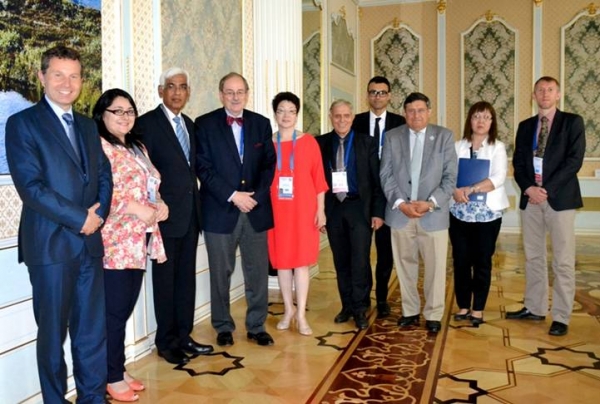UN High Level Conference on Implementation of the International Decade for Action: “Water for Life”

The UN conference “Water for Life” continued into its second and concluding day on June 10, 2015 with six High Level Round Tables and two plenary sessions reviewing: water and sanitation actions beyond 2015; links between world water, energy and food systems; global challenges such as disaster risk reduction from the perspective of water resources; financing and governance mechanisms for national and international water access, management and sharing; cooperation on water sharing as a catalyst for achieving Millenium Development Goals and the peaceful, sustainable common use of trans-boundary water; and building integrated approaches for achieving Sustainable Development Goals.
One of the morning parallel sessions, the High Level Round Table # 3 entitled “Global Challenges from a water perspective” has been organized by Central Asia Mountain Hub in partnership with the UN OCHA (UN’s Office for Coordination of Humanitarian Affairs). Co-chaired and opened by Mr. Pesnani, AKDN Representative to Tajik Republic and Mr. Khalikov, UN OCHA Director, the session had high level panel of 1) Ms. Svetlana Buidysheva, Deputy Minister for Economics, Altai Republic, Russian Federation, 2) Mr. Hanspeter Staffler, Italian Delegation to the Alpine Convention; 3). Mr. Francois Muenger, Special Envoy for Water, Swiss Agency for Development and Cooperation; and 4) Ms. Svetlana Jumaeva, Director, Centre for Climate Change and Disaster Reduction.
The panel discussion moderated by Mr. Jerome Delli Priscoli, Board Member, World Water Council has saw some 80 participants who had a very rich discussion and much of interaction. The participants discussed about the potentials of the water being as a source of life for up and downstream, high and lowland population. They also highlighted the potential of it becoming as a source of the tension and conflicts as illustrated in several places around the world. It was widely agreed by the participants that the water can serve as a source of cooperation and reconciliation by providing a solid path for conflict resolution and peace.
The highlights of the session have been summarized and presented by Elbegzaya Batjargal, Regional Program Officer, Central Asia Mountain Hub to the Final Plenary session of the UN Conference. The summary integrates a handful of points on the session discussion around the topic of:
1) Global changes (socio economic, environmental) and its linkage to poverty, exacerbating the extent of the problem, specially hitting hard through the poor. The issue of distribution of wealth and benefits has been highlighted in context of mountain countries not getting the benefits they deserve and entitlements for their stewardship service over ecosystem goods and services they provide for downstream.
2) Capturing full value of the ecosystem goods and services provided by the water related ecosystems including the mountains (as defined in the SDG 6.6.), scaling up the schemes such as PES and other economic instruments for rewarding and compensating the poor and marginalized from uplands. Capacity building and cross-learning have been prioritized to this regard.
3) Need in improved level of preparedness and short term immediate responses to frequent emergencies due to increased vulnerability, One of the key highlights the participants noted was to ensure direct linking of emergency preparedness and humanitarian responses with the development processes.
4) The need in development planning and regulatory frameworks to be multidisciplinary, employing holistic and integrated approaches (not overlooking sources and headwaters originating in high mountains) for managing the resource base, take into account the specific needs of regions and solid understanding of the facts. For this, the importance of quality and accessible data has been emphasized for understanding disaster cycles in case of disasters, and the state of the resources when it concerns the resource management such as water. The participants of this round table noted to integrate water management issues as a strategy to avoid impeding conflicts and resolve existing ones.
5) The participants also highlighted the importance of involving local communities, civil societies, private sector and relevant stakeholders in designing risk mitigation, preparedness and response activities, addressing development challenges in mountain regions by learning from their vast experience and localize climate adaptation, risk management and responses as well as development plans and strategies.

Facebook comments